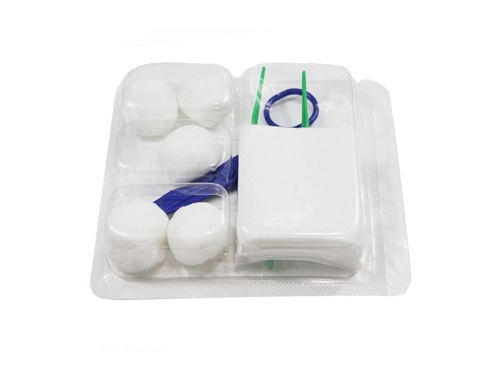In the ever-evolving medical technology, disposable surgical kits have become an essential tool in the modern operating room. Disposable surgical kits are strictly sterilized, contain instruments, dressings and care supplies required for surgery, and can only be used once.
Disposable surgical kits offer significant advantages over traditional surgical instruments. First, they offer a high degree of convenience and efficiency. Medical staff do not need to spend time and energy on cleaning, sterilizing and packaging surgical instruments, they can just open the package and use them. Secondly, disposable surgical kits effectively reduce the risk of instrument cross-infection. New disposable packaging is used for each surgery to avoid repeated use of instruments and the potential risk of cross-infection. Finally, disposable surgical kits provide a better post-operative recovery environment. The materials used in post-operative patients are all new, reducing the possibility of post-operative infection.

High-quality materials are crucial when choosing a disposable surgical bag. High-quality disposable surgical kits are made of sterile and non-toxic materials and comply with strict hygiene standards to ensure the safety of patients and medical staff during surgery.
Commonly used materials for disposable surgical kits include SMS, PP non-woven fabrics, cotton dressings, transparent PE films, etc. These materials have good breathability and can prevent patients from skin allergies and other problems caused by embedding during surgery. In addition, high-quality materials also have good penetrability. Medical staff can visually observe the number and type of surgical instruments through the packaging, ensuring that no instruments are missed during the operation and improving the accuracy and efficiency of the operation.

Disposable surgical kits play an important role in improving surgical efficiency. Traditional surgical instruments need to be cleaned, sterilized and packaged before use, which requires a lot of time and energy from operating room personnel. Disposable surgical kits eliminate these steps, and medical staff only need to open the package to start the operation. This greatly shortens the surgical preparation time and improves the efficiency of the entire surgical process.
In addition, disposable surgical bags reduce the risk of contamination within the operating room. The cleaning and disinfection process of traditional surgical instruments can easily cause bacterial residue and infection, and the use of disposable surgical kits can effectively reduce such risks. The instruments, dressings and care products in the disposable surgical kit are all brand new, which fully avoids the problem of contamination caused by repeated use, thereby improving the overall hygiene level inside the operating room.

Disposable surgical kits play an important role in modern operating rooms due to their convenience, efficiency, safety and reliability. The use of high-quality materials ensures the safety of patients and medical staff after surgery and improves efficiency throughout the surgical process. In addition, the use of disposable surgical bags can also reduce the risk of contamination in the operating room and provide a better postoperative recovery environment. As technology continues to advance, disposable surgical kits will continue to play an important role in the operating room, providing better outcomes for patients. Moreover, the humanized design enables doctors and patients to avoid cross-infection as much as possible before, during and after surgery, reducing operating room contamination. This provides guarantee for improving the quality of interventional surgery.